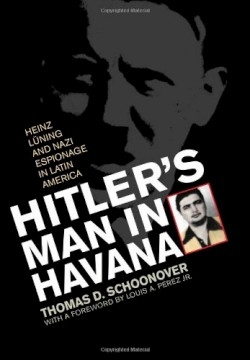Hitler's Man in Havana
Heinz Luning and Nazi Espionage in Latin America
Schoonover tells a hilarious story: the Abwehr sought the best but in Heinz Lüning got the worst. It needed an agent in Havana: given naval routes and schedules, U-boats could wreak even greater havoc on ships carrying war materiel eastward to Britain and westward to the Pacific theater. Heinz Lüning wanted a comfortable war: espionage in Latin America (he had lived briefly in the Dominican Republic) seemed ideal. The Abwehr had no faith in its agent; Lüning had no commitment to his mission. He couldn’t build a radio, mix secret ink, or recruit a network.
Identified via British mail intercepts in the Bahamas, Lüning was arrested, tried, and executed for his never-made radio con-tacts with U-boats whose never-fired torpedoes caused imaginary Allied deaths. Schoonover demonstrates how everybody (except Lüning) benefited; acclaim for UK, US, and Cuban security chiefs; a Cuban—US rapprochement; and boosted morale as the “massive spy network” had been neutralized. Ineptitude and manipulation get no better—but sparked Graham Greene’s Our Man in Havana. Schoonover had to dig deep to find his facts; to prevent widespread embarrassment, a semi-official cover-up still persists.
Reviewed by
Peter Skinner
Disclosure: This article is not an endorsement, but a review. The publisher of this book provided free copies of the book to have their book reviewed by a professional reviewer. No fee was paid by the publisher for this review. Foreword Reviews only recommends books that we love. Foreword Magazine, Inc. is disclosing this in accordance with the Federal Trade Commission’s 16 CFR, Part 255.

